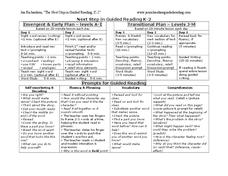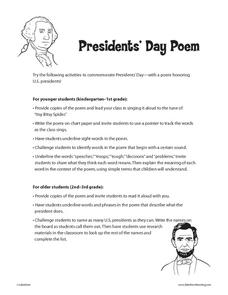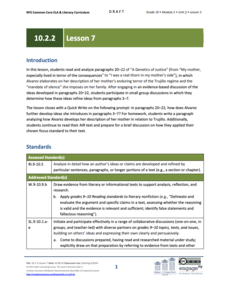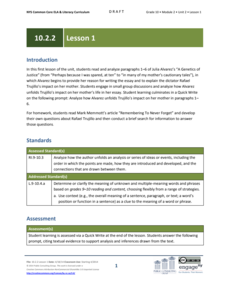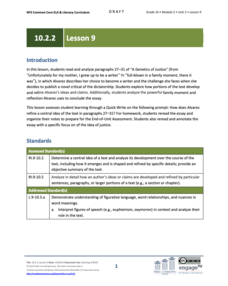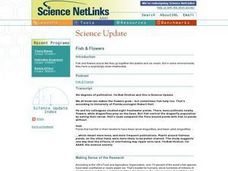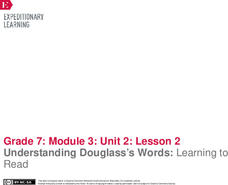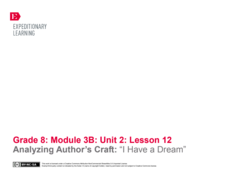Curated OER
To Kill a Mockingbird
Provided here are activities and questions for Part I of To Kill a Mockingbird (although one activity is also included for Part II). Readers study the novel's plot, characters, and setting. I wouldn't recommend using this as the sole...
Wisconsin State Reading Association
Next Step in Guided Reading
Here are three guided reading lesson plan templates; each designed to meet the needs of a specific level of readers. Levels in focus are emergent, early, and transitional readers. Additionally, prompts to support your small group...
Progressive Phonics
Short Vowel “A”
Support your phonics instruction with this beginner reading book that focuses on the short vowel /a/. The book is divided into four chapters based on the word families at, ad, an, and am. Letters and words used are c, a, t, s, m, n,...
Lakeshore Learning
Presidents' Day Poem
What a great way to combine English language arts with your celebration of Presidents' Day! Youngsters are guided through the reading of a poem sung to the tune of "Itsy Bitsy Spider" on the jobs of the president of the United...
EngageNY
Grade 10 ELA Module 2: Unit 2, Lesson 7
"No flies fly into a closed mouth." Pupils consider the proverb's meaning as they read paragraphs 20–22 from the essay "A Genetics of Justice" by Julia Alvarez. They also engage in small-group discussions about how the author refines her...
EngageNY
Grade 10 ELA Module 2: Unit 2, Lesson 8
How do people's relationships with their parents impact their lives? Scholars read paragraphs 23–26 from "A Genetics of Justice" by Julia Alvarez, in which the author details her relationship with her mother. Pupils discuss how the...
EngageNY
Grade 10 ELA Module 2: Unit 2, Lesson 4
What does it mean to come undone? Scholars consider the author's use of the phrase as they read paragraphs 12–15 from Julia Alvarez's autobiographical essay "A Genetics of Justice." They complete a quick write to analyze how Alvarez...
EngageNY
Grade 10 ELA Module 2: Unit 2, Lesson 2
What is a megalomaniac? Scholars discover the word's meaning as they read and analyze paragraphs seven and eight from Julia Alvarez's essay "A Genetics of Justice." They also read Mark Memmott's article "Remembering to Never Forget" and...
EngageNY
Grade 10 ELA Module 2: Unit 2, Lesson 1
Rafael Trujillo was president of the Dominican Republic in the 1930s. Pupils read and analyze the first six paragraphs of Julia Alvarez's autobiographical essay "A Genetics of Justice," in which the author describes Trujillo's impact on...
EngageNY
Grade 10 ELA Module 2: Unit 2, Lesson 3
Does trauma have a lasting effect on people's lives? Scholars dive into the topic as they read paragraphs 9–11 of "A Genetics of Justice" by Julia Alvarez, in which the author describes her family's return to the Dominican Republic....
EngageNY
Grade 10 ELA Module 2: Unit 2, Lesson 6
How do authors use rhetorical devices and word choice to emphasize their ideas? Pupils consider the question while reading paragraphs 16–19 from Julia Alvarez's essay "A Genetics of Justice." Readers engage in evidence-based discussion...
EngageNY
Grade 10 ELA Module 2: Unit 2, Lesson 9
How do authors develop the main ideas in their writing? Pupils consider the question as they read and analyze paragraphs 27–31 from Julia Alvarez's essay "A Genetics of Justice," in which Alvarez describes her decision to become a...
Curated OER
Fish and Flowers
Students read and discuss a research article that explains the unlikely link between increased fish populations and increased plant pollination. They answer reading guide questions to discover this ecological relationship.
Curated OER
Designing the Experiment and Answering the Question
Students investigate scientific methods by analyzing an article from the Natural Inquirer. In this data analysis lesson, students read an article from the magazine and discuss at least 2 scientific methods that could be used to...
Curated OER
Chapter 1 Guided Notes: The Science of Biology
Specifically designed as a textbook reading guide, this worksheet may not apply to your biology course. It asks participants to list characteristics of life and the hierarchical organization levels. It vaguely deals with scientific...
Curated OER
Cell Processes and Energy - Reading/Notetaking Guide - Cell Differentiation
Written as a textbook section reading guide, this activity presents an empty outline on cell differentiation for biology learners to complete. There are also a few questions to answer about how cells specialize and become organized,...
Curated OER
WHAT, IF ANYTHING, IS A ZEBRA?
Students read the essay, "What, If Anything, Is a Zebra?" following a teacher made reading guide. They investigate cladistics, shared derived characteristics, with further online research to enhance their study of evolution and...
Curated OER
Resources - A Reading Guide
In this resources worksheet, students compare and contrast physical and chemical properties and changes. Students review the periodic table, pattern of atomic numbers and chemical reactivity. This worksheet has 56 short answer questions.
Planet e-Book
Wuthering Heights
Though it is Emily Bronte's only novel, Wuthering Heights became one of the greatest of all-time. The classic novel gets an update in the form of an eBook. Readers learn about Heathcliff, Catherine, Edgar, and the other characters...
EngageNY
Understanding Douglass’s Words: Learning to Read
How is a sentence like the human body? Scholars think about the comparison as they view an image of the human anatomy and begin to complete an Anatomy of a Sentence anchor chart. They review roots, prefixes, and suffixes and then begin...
EngageNY
Close Reading: Focusing on Taking a Stand (Chapter 2 cont.)
Scholars complete a close read of To Kill a Mockingbird and determine why characters take a stand. They use text-dependent questions and Note-catchers to help guide their thinking. Readers review the Taking a Stand Anchor chart and...
EngageNY
Analyzing Author’s Craft: “I Have a Dream”
It's time to make some connections! Scholars complete a close reading of the speech I Have a Dream by Martin Luther King, Jr. They use an I Have a Dream Speech Gist Note-catcher, and I Have a Dream text-dependent questions to guide their...
Elizabeth Murray Project
Gender and Opportunity in Colonial America
What was life like for women in Colonial America? What restrictions were placed upon them and what opportunities were they afforded? A case study of Elizabeth Murray offers high schoolers a chance to investigate primary source...
EngageNY
Reading for Gist: “Middle Ages” Excerpt 1
Dig deep. Scholars dig deep for meaning while reading Middle Ages Excerpt 1. They begin by finding unfamiliar words and adding them to a word catcher. Pupils then take a close look at adversity in the text and complete an...
Other popular searches
- Guided Reading
- Guided Reading Comprehension
- Flat Stanley Guided Reading
- Guided Reading Lesson Plans
- Guided Reading Strategies
- Guided Reading Lessons
- Guided Reading Activities
- Guided Reading Fluency
- Dinosaur Guided Reading
- Guided Reading Elementary
- Guided Reading Lessons Plans
- Active Reading Guide



